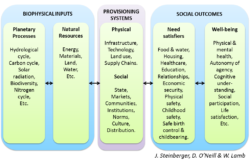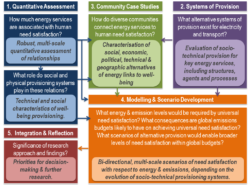About
The LiLi project is based on an innovative framework, integrating (1) biophysical resource use, (2) the social and physical provisioning systems which draw up on these resources as inputs, and (3) the social outcomes which depend upon them. Each of these three phases, and their constitutive elements, have traditionally been the purview of separate disciplines. The purpose of this project is to present a new integrative research approach, highlighting the crucial role of provisioning systems in linking physical and social processes and outcomes, and thus in enabling empirical research into achieving well-being within a bounded economy.
The crucial role of provisioning systems in connecting physical and social processes and outcomes remains sparsely researched. This is because the topic spans traditional disciplinary boundaries, requiring a coherent operational framework, robust concepts, methods and metrics bridging the social sciences (living well within society) and natural and physical sciences (physical resources and technologies, environmental limits), which could be applied equally to industrialised and developing contexts.
Research framework

Energy services
Energy will be the main biophysical input considered: robust international datasets of energy use exist, covering the past 45+ years; energy use has a clear connection to planetary impacts through greenhouse gas (GHG) emissions and climate change; and novel methods have been developed for analysing the supply chain of energy specifically, from primary extraction to service delivered to the end-user. Energy is never consumed directly for its own sake, but for the sake of the services (warmth, light, mobility, energy embodied in products, including food) that it delivers. Energy services may thus hold the key to connecting energy use with social outcomes, as various combinations of energy services are likely to satisfy different dimensions of human well-being.
Social outcomes
Within the LiLi project, social outcomes are considered through from the perspective of human well-being, rather than economic development. Specifically, the LiLi project will be based on the Theory of Human Need of Doyal and Gough, but will also draw upon ideas from capabilities and human development, and on the participatory methodology of Max-Neef’s Human Scale Development. The two main reasons for focusing on this approach are, first, that it is well-defined, listing a finite number of universal, satiable, non-substitutable needs (considered as pre-requisites for living well), and, second, that it incorporates the concept of “satisfiers” of human needs, the cultural, technical, political, economic ways in which different communities satisfy the needs of their members. Different communities can be studied according to their unique satisfier configurations, correspondingly diverse social and physical provisioning systems, and ultimately in terms of their performance in enabling need satisfaction at different levels of resource use.
LiLi research components

Provisioning systems
“Provisioning systems” is the broad term used to describe the chain linking the production, distribution and consumption of the goods and services through which human needs are met. Provisioning systems form the link between social resource use and social outcomes. The study of social provisioning systems, known under the term “systems of provision” has been formalised Fine & Leopold. A key consideration is that social aspects of provisioning systems influence physical aspects, and vice-versa. For instance, electricity is often dominated by monopolistic or oligopolistic generation organisation and centralised technologies: heavy regulation aims to check their power, but also protects the status quo by shielding it from competition by fundamentally different providers (local micro-generation, for instance). Similar mechanisms can be seen for personal transportation and the role of the automobile industry. Therefore it is vital to consider both social and physical aspects of provisioning systems, since their interdependencies may constitute significant opportunities or constraints. By elaborating the systems of provision approach, embedded within the wider unifying notion of social provisioning, analysis will go beyond exchange to “the study of the on-going economic process that provides the flow of goods and services required by society to meet the needs of those who participate in its activities” (Gruchy 1987).
Studying decoupling
Studying alternative provisioning systems, in both their physical and social aspects, is necessary to understand how well-being may be decoupled from resource use. Depending on social and physical supply chains and efficiencies, more or less energy may be required to reach high levels of well-being. Interestingly, some of the most important decoupling opportunities are likely to be found at the community level: economies of scale through provision of efficient networks of energy service delivery or collective demand-side measures. Examples of socio-technical provisioning systems between energy and well-being could be the existence of collective systems (local supply networks, public transit …), in contrast with highly individualised systems, where each household has to use its own forms of energy to procure goods and services. Such collective systems may also provide more resilience to shocks in energy supply or prices than highly efficient, but individualised, technologies.
